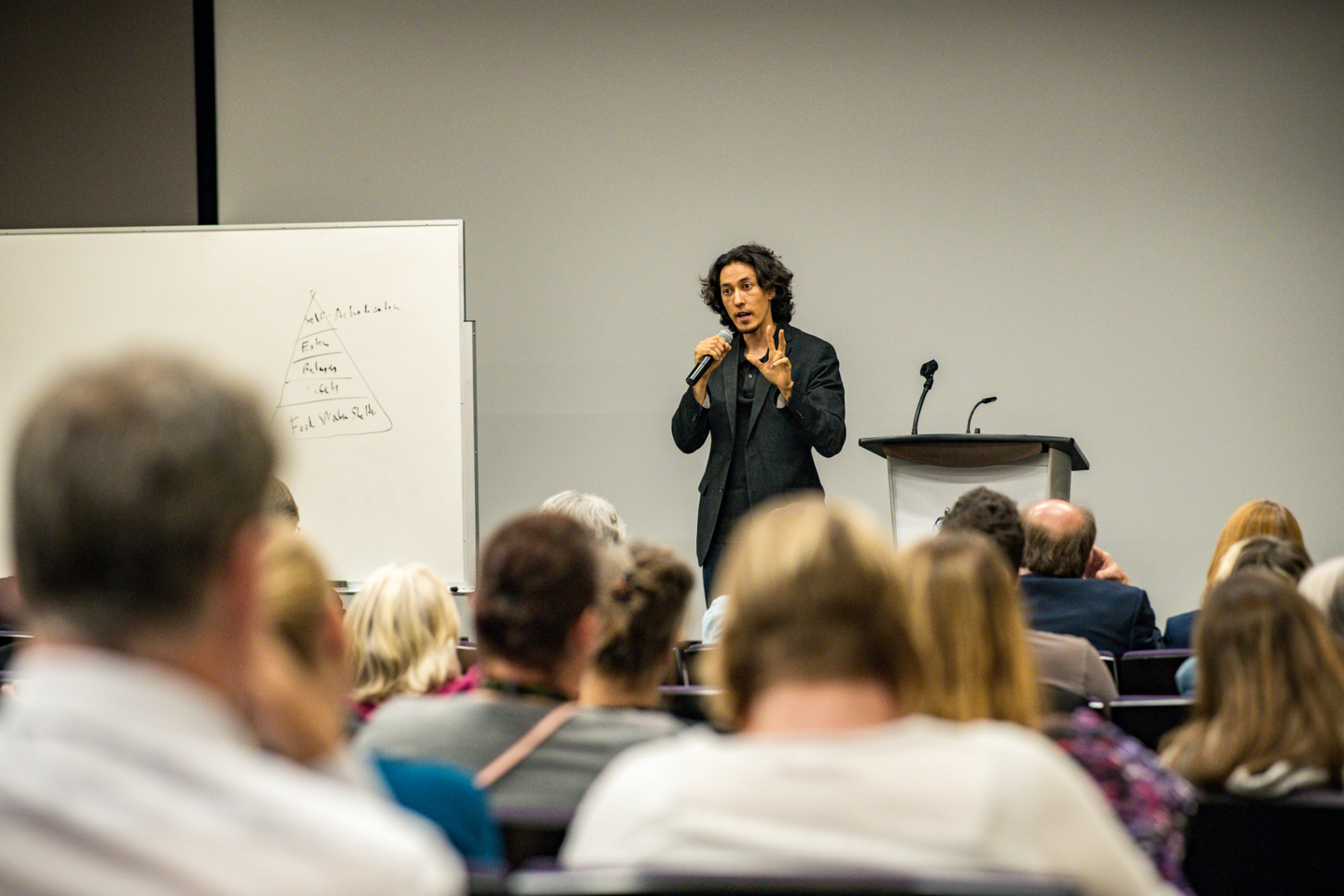Peace activist Paul K. Chappell kicked off this year’s President Leadership Lecture Series on Wednesday, Oct. 17 in UFV’s lecture theatre.
In his lecture, A New Peace Paradigm: Our Human Needs and the Tangles of Trauma, Chappell outlined the non-physical needs that he believes must be met to create peace, and the necessity of peace literary education. His current initiative is promoting peace literacy education and making it accessible.
Chappell has an unusual background for a peace activist, having been a soldier in the U.S. army and growing up in a violent household. This background has informed his own conception of peace and the human condition.
In Chappell’s lecture, he argued that in order to understand peace and how to achieve it, one must first understand the human condition. Chappell invited the audience to question what human needs are, and challenged Maslow’s hierarchy of needs — a pyramid in which basic physiological needs must be met before one can move up the hierarchy toward more complex needs — with a model of his own.
Humans have nine non-physical needs in Chappell’s model: purpose and meaning, nurturing relationships, explanations, expression, inspiration, belonging, self-worth, challenge, and transcendence.
“What is more important for humans, food or purpose and meaning?” Chappell asked his audience in the lecture.
Chappell argued that without purpose and meaning, humans lack the will to live. He cited experiences in Uganda where each person he asked this question chose purpose and meaning over food. Maslow’s hierarchy does not take into account, according to Chappell, that a person with purpose will overcome adversity to get their physical needs met. The other side of the coin is that people will give up food, safety, and even their lives for a cause they consider worthy.
Another primary non-physical need in Chappell’s hierarchy is explanations. He pointed out that humans are the only species that rationalize the world around them with explanations of science, religion, and philosophy. This need for explanations is so powerful that humans will come up with an irrational explanation if they do not have a rational one.
Chapelle argued that worldviews are dependent on explanations. Similarly, a person’s worldview can function like a forcefield, deflecting contradictory facts.
“If you threaten someone’s worldview, they often react like you’re threatening their physical body,” Chappell said.
The foundation of nurturing relationships, Chappell stated, is trust. Every person wants to be around people they feel they can trust, and when they do not have safety, their need for trust increases.
Expression consists of the ability to express emotions and, as evidenced in babies, can be understood as the first human need to activate. Without food and safety, need for expression increases, and can manifest in riots and protests — in this way, the human need for expression gets physical needs met.
According to Chappell, when trauma becomes tangled in one’s non-physical needs, it distorts them. He referred to this as “the tangles of trauma.” Each need on his hierarchy can become corrupted by trauma and turned into its antithesis: belonging becomes alienation, self-worth becomes self-loathing, purpose and meaning become meaninglessness and nihilism, explanations become disillusionment and a ruthless worldview.
Through Chappell’s model, peace conflicts come down to a lacking in one or more areas of non-physical needs. The commonality of all serial killers and mass shooters, Chappell believes, is a lack of belonging and subsequent feelings of alienation.
“If you could get rid of feelings of alienation, there would be no more mass shooters,” Chappell said.
Chappell believes peace must be viewed as a competency like math or reading, something to be taught and practiced regularly. He views peace literacy as a human right which “empowers us to protect our other human rights.”
Without peace education, stated Chappell, humanity has been set up for failure in a world with the technology to destroy humankind, and therefore, peace literacy must be viewed as survival literacy.
Image: UFV Flickr


